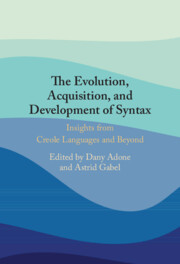Book contents
- The Evolution, Acquisition, and Development of Syntax
- The Evolution, Acquisition, and Development of Syntax
- Copyright page
- Contents
- Figures
- Tables
- Contributors
- Acknowledgments
- Abbreviations
- 1 Introduction
- Part I The Evolution of Syntax
- 2 From the Protolanguage Spectrum to the Underlying Bases of Language
- 3 From Protolanguage to Deuterolanguage: The Importance of Compounds
- 4 The SOV Mystery and Language Evolution
- 5 Broken Windows: Creoles, Pidgins, and Language Evolution
- 6 Roots of Syntax: Anaphora and Negation in Creoles
- Part II The Acquisition of Syntax
- Part III The Development of Syntax
- Index
- References
4 - The SOV Mystery and Language Evolution
from Part I - The Evolution of Syntax
Published online by Cambridge University Press: 19 February 2025
- The Evolution, Acquisition, and Development of Syntax
- The Evolution, Acquisition, and Development of Syntax
- Copyright page
- Contents
- Figures
- Tables
- Contributors
- Acknowledgments
- Abbreviations
- 1 Introduction
- Part I The Evolution of Syntax
- 2 From the Protolanguage Spectrum to the Underlying Bases of Language
- 3 From Protolanguage to Deuterolanguage: The Importance of Compounds
- 4 The SOV Mystery and Language Evolution
- 5 Broken Windows: Creoles, Pidgins, and Language Evolution
- 6 Roots of Syntax: Anaphora and Negation in Creoles
- Part II The Acquisition of Syntax
- Part III The Development of Syntax
- Index
- References
Summary
Givón’s chapter presents an evolutionary hypothesis suggesting that the earliest rigid word order in human language must have been (S)OV. The hypothesis is supported first by synchronic distributional data suggesting that the vast majority of known language families can be easily reconstructed to SOV on purely internal grounds. Unlike the vast majority of VO languages, SOV languages show no reconstructible traces of any prior VO word order. What is more, a non-contact-induced drift from VO to OV has yet to be conclusively documented. The chapter offers a cultural-communicative explanation of why the early evolved word order of human language must have been SOV, as well as why it has been drifting away from that early order ever since, first to free (pragmatically determined) word order, then to V-first (VSO, VOS), and eventually to SVO. Why some languages have never undergone this drift remains an open question, perhaps related to isolation and/or cultural conservatism.
Keywords
Information
- Type
- Chapter
- Information
- The Evolution, Acquisition and Development of SyntaxInsights from Creole Languages and Beyond, pp. 49 - 73Publisher: Cambridge University PressPrint publication year: 2025
